The Portland Independent Chamber of Commerce (PICOC) has turned their influential attention to an issue near and dear to our hearts: the struggle for safer streets.
Launched early this year by a relatively young cadre of tech industry leaders as an antidote to the Portland Business Alliance, PICOC wants more Portland businesses to step up and support “the Vision Zero movement.”
Their latest campaign hit inboxes and social media feeds today. It’s timed to influence City Council’s upcoming vote on the Vision Zero Action Plan released by the Portland Bureau of Transportation earlier this month. Council is slated to formally adopt the plan on October 12th.
Here’s the full text of the message they want businesses to sign onto:
There’s a disturbing trend in Portland. Over the past 25 years the city has steadily been lowering traffic deaths, but the past two years this progress has reversed. In 2015, 37 people died, the highest count for the past 12 years. This year has been even more grim: as of September 18th, 32 people have died [note: the actual number is 35], including 9 [10] pedestrians and four cyclists. If the current trend holds traffic deaths will be back at 1990’s levels.
These traffic deaths represent an equity crisis. They disproportionately occur in neighborhoods with larger minority and low-income populations. Residents of low-income neighborhoods in Multnomah County are 2.3 times more likely to be killed walking. Oregonians aged 65 or older are four times more likely to be killed while walking. We are failing to protect our most vulnerable citizens, and in doing so we are failing to uphold our values as Portlanders.
Portland has long had a reputation for being a walkable, bikeable city with great public transportation. However, this reputation is only deserved by our close-in neighborhoods. These inner neighborhoods have seen marked increases in rents and home prices. Portland’s remaining affordable neighborhoods lack basic amenities like sidewalks, bike lanes and frequent bus service. Without safe alternatives, residents of these outer neighborhoods are being pushed into auto dependence.
Advertisement
Portland has a vision to fix this. Last year, our City Council formally adopted an audacious goal to eliminate all traffic deaths and serious injuries. This policy, called Vision Zero, states that all traffic deaths are preventable, and that no traffic deaths are acceptable. The idea started in Sweden and has spread around the world. Vision Zero has been endorsed by Portland’s current and incoming mayors, our transportation commission and the head of the Bureau of Transportation.
Despite official support achieving Vision Zero will be difficult. We need the courage to pursue policies and projects that decrease our auto dependence and reach our goal of a sustainable, low-carbon city. We must make biking and walking safe throughout Portland. We must continue to aggressively invest in our transit infrastructure. We must move towards a downtown where few ever feel the need to drive.
Portland has a reputation for being a city that is affordable, sustainable, and equitable. If we fail to eliminate traffic deaths, we fail to uphold these values. Failing would mean more high-traffic roads, fewer walkable neighborhoods, and no affordable neighborhoods where biking is safe and family-friendly. It would mean a Portland that is increasingly divided.
PICOC encourages all Portland businesses to join us in supporting the Vision Zero movement. Let’s remember why we started our businesses here, why we can attract top talent to live here, and how our businesses benefit from the halo of Portland’s reputation as a great American city. Let’s remind elected leaders of their commitment to decreasing auto dependence, and support them when progress inevitably leads to controversy.
Our City Council votes on October 12th on whether to adopt an action plan to pursue Vision Zero. We are calling on members of the business community to sign this testimony urging City Council to adopt the Vision Zero action plan.
The testimony is signed by local investor Alex Payne, an early employee of Twitter and co-founder of Simple, an online bank; Glenn Fee, Vice President of Gateway to College; Lennon Day-Reynolds, an investor and tavern owner; Mara Zepeda, CEO of Switchboard; Marcus Estes, CEO of Chroma; and William Henderson, CEO of Knock Software. (You might recall Henderson from our profile of his bike-related projects last year. Henderson is also a new member of the PBOT Bureau and Budget Advisory Committee.)
This is PICOC’s first foray into transportation advocacy. They’ve previously helped raise awareness and funding for a variety of causes including black entrepreneurs, a nonprofit community publishing organization, a nonprofit newspaper, open city government data, and more.
— Jonathan Maus, (503) 706-8804 – jonathan@bikeportland.org
BikePortland is supported by the community (that means you!). Please become a subscriber or make a donation today.

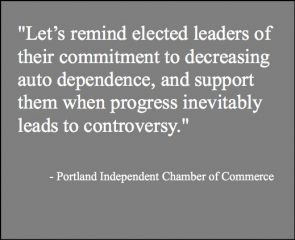
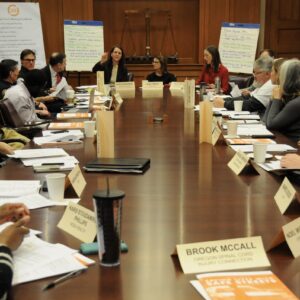
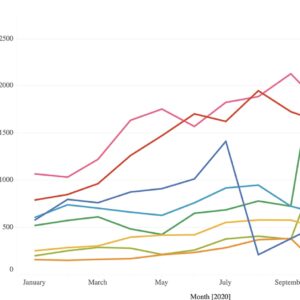
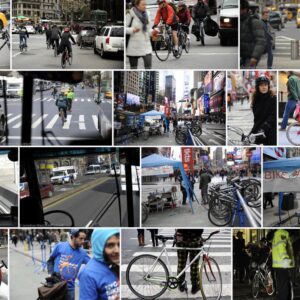
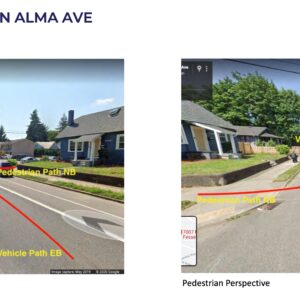
Thanks, Jonathan. I’ve updated the testimony to reflect the latest numbers. Disturbing that they changed that much between when I originally wrote it and now.
William- even the city’s numbers have been incorrect. As you can see on the sheet, we are trying to fill in details, which is strangely hard for events that haven’t gotten news attention.
I would PICOC to consider pressing PBOT to add bike facilities to Skidmore. Skidmore should provide a safe and comfortable way for people on bikes to move between NE and N Portland and access the commercial streets in Kenton, along Interstate, Mississippi, Williams, MLK and Alberta. Skidmore needs continuous bike facilities added between N Interstate Ave and NE 7th. If buffered/protected bike lanes were added, the Concord, Michigan and Going greenways would become interconnected with safe (and existing!) crossings of Interstate, Mississippi, Williams, Vancouver, MLK, and 7th. Combine this with some real safety improvements to 7th and a new bridge over I-84 and the whole inner eastside is starting to have some connectivity. As it stands now, people on bikes will continue to use Skidmore because it provides the necessary connections in N/NE Portland, but these people will continue to be endangered by reckless drivers passing too closely. By using the existing direct route that Skidmore offers, the safe, existing, signalized crossing at busy streets, and the replacement of underutilized parking with buffered bike lanes, the City could connect some of its most-used Greenways into a highly useful network for a very low cost with very low impact (maybe even an improvement) to people driving.
Buffered bike lanes on Skidmore would require removal of all parking, and you would get a 2 foot buffer with a 6-foot bike lane. That layout also only works west of MLK, where the street is 36 feet curb to curb, and would remove any swales installed. East of MLK (to 7th and beyond) there is only 30 feet curb to curb, so no buffers unless you remove a travel lane.
It is also a Major Emergency Response route.
That sounds pretty great! east of MLK, sharrows would be fine. I would think no on-street parking and Emergency Route would be complimentary.
Yes, please.
About time.
The day after my 65th birthday did I instantly become 4 times more likely to be killed while walking?
This cavalier application of numbers does not inspire confidence in these folks.
Also remember that VZ primarily was designed to protect motorists; we cyclists have the least to gain from it.
To answer your question: no, you do not. That doesn’t make the statistic false. The elderly are more likely to be killed while walking. Realistically, your odds would increase slowly as you age, but there are many other variables, including physical ability and walking environment that might affect your individual odds.
Physical ability/agility, like being able to turn your head as quickly to look, or how fast you walk, is one side of the coin. With age also comes physical frailty, where your body does not recover as quickly, and can be damaged more easily.
I recall a case where a service vehicle, going 5 mph, backed into a person that fell and died. That person was 80.
There is a reason those of us over 50 are called ‘over the hill’ (we’re on the decline side).
Bravo PICOC! The business heroes we need right now.
Here is a great opportunity for easy living room advocacy!
I’m recommending everyone hop on their computers and email a link to the PICOC testimony or retweet their link on twitter to all the local businesses (restaurants, upcycle shops, small concert venues, food carts, garden supply stores, whatever!) that you frequent. Let them know you’re a customer who walks/bikes to their business, and it’s important that the businesses you patronize support a transportation network that allows you to do so safely!
I emailed 15 businesses and tweeted 40 more. How about you?
Big thanks to the people making this happen.